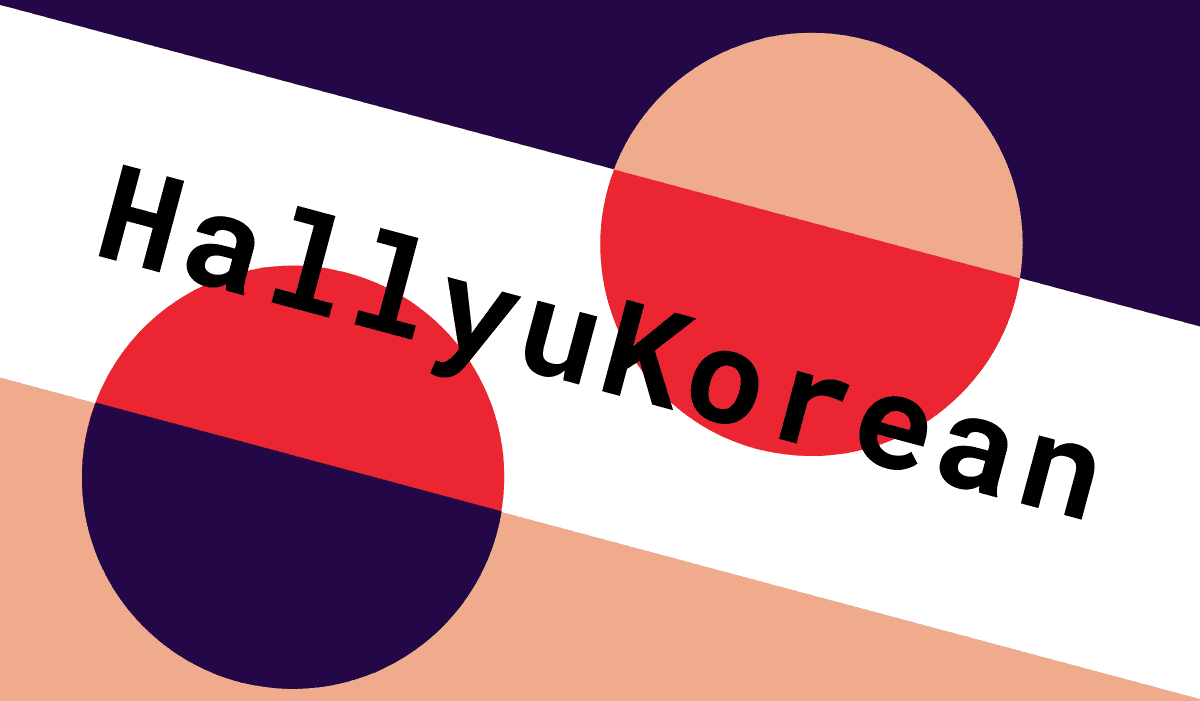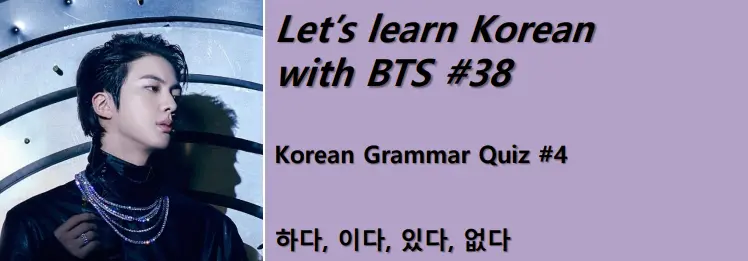Korean Grammar Quiz #4 : 하다, 이다, 있다, 없다
Please read and learn from the Learn Korean with BTS posts below and take this quiz to test your knowledge.
1 – Quick Guide to Hangul, Korean
2 – 가다, 걱정, 계속, 괜찮다, 기억, 길
3 – 나, 너, 노래, 누구, 눈, 느낌
4 – 다르다, 다시, 달, 돈, 두렵다, 듣다
5 – 라면, 랩, 레스토랑, 레슨, 로또, 리더
6 – 마음, 많이, 말하다, 매일, 모르다, 미치다
7 – 발, 밤, 별, 보다, 비, 빛
8 – 사람, 사랑, 생각, 세상, 손, 시간
9 – 알다, 오늘, 오다, 우리, 웃다, 원하다
10 – 잠, 좋다, 주다, 지금, 진짜, 집
11 – 차다, 찾다, 처음, 최고, 춤, 친구
12 – 카드, 칼, 커피, 코, 크다, 키스
13 – 타다, 탕진, 태양, 태어나다, 특별하다, 틀리다
14 – 평생, 포기하다, 표정, 푸르다, 피, 필요
15 – 하다, 하루, 함께, 항상, 행복, 힘
16 – 까맣다, 깨다, 꽃, 꿈, 끌어안다, 끝
17 – 땀, 때, 떠나다, 또, 뛰다, 뜨다
18 – 빨리, 빠지다, 빨갛다, 빵, 뻔하다, 뽀뽀
19 – 싸움, 싹, 쓰다, 쓰러지다, 쓸데없다, 씨
20 – 짜증, 짧다, 째다, 쩔다, 찍다, 찢다
It’s a Korean verb meaning ‘to do’ or ‘to be’.
Choose the correct answers to complete the sentences.
1. 난 이 순간 행복( )
I’m happy in this moment
① 해 ② 이야 ③ 있어 ④ 없어
2. 미안( ). 사랑( ). 용서( ).
I’m sorry I love you Forgive me
① 있다 ② 해 ③ 없다 ④ 먹다
3. 우리 결혼( )
Let’s get married
① 살다 ② 있다 ③ 놀다 ④ 해
4. 너 지금 위험( )
You’re in danger right now
① 뛰어 ② 자다 ③ 해 ④ 있어
5. 내가 뭐 틀린 말 ( )?
Did I say something wrong?
① 있다 ② 했어 ③ 없어 ④ 놀아
It’s a Korean verb meaning ‘to be’.
Choose the correct answers to complete the sentences.
6. 새 기록은 자신과 싸움( )
The new record is the fight against oneself
① 놀지 ② 이지 ③ 없지 ④ 뛰지
7. 이것도 큰 욕심( )?
Am I too greedy?
① 없지 ② 먹지 ③ 뛰지 ④ 일까
8. 아니면 진한 키스( )?
Or was it a deep kiss?
① 였나 ② 하지 ③ 두렵지 ④ 뛰지
It’s a Korean verb meaning ‘to be’, ‘to have’.
Choose the correct answers to complete the sentences.
9. 내게 하루만 시간이 ( )
If I had only one day
① 말하다 ② 모르다 ③ 있다면 ④ 한다면
10. 좋은 집 좋은 차 그런 게 행복일 수 ( )?
A good house, a good car, will those things bring happiness?
① 있을까 ② 할까 ③ 이다 ④ 모르다
11. 나도 친구가 ( ) 좋잖아
It’s good that I have a friend, too
① 타면 ② 차면 ③ 있음 ④ 뛰면
It’s a Korean verb meaning ‘to not have’.
Choose the correct answers to complete the sentences.
12. 별 거 ( )
Nothing special
① 없어 ② 타 ③ 뛰어 ④ 날아
13. 오늘 뭐 실수는 ( )?
Did I make any mistakes today?
① 틀리다 ② 까맣다 ③ 날아 ④ 없었었나
14. 다 쓸데( )
It’s good for nothing
① 쓰다 ② 빠지다 ③ 없어 ④ 빠지다
15. 꿈이 ( ) 괜찮아
It’s okay if you don’t have a dream
① 없어도 ② 먹어도 ③ 놀아도 ④ 뛰어도
Quiz Answers
*Noun + 하다 : to do, to be
*Noun + 이다 : to be
*있다 : to exist, to have
*없다 : don’t exist, don’t have
1-①, 2-②, 3-④, 4-③, 5-②
6-②, 7-④, 8-①, 9-③, 10-①
11-③, 12-①, 13-④, 14-③, 15-①
*Tense
*Present tense : Adjective/verb stem + ~아/어/해요
*Past tense : Adjective/verb stem + ~았/었/했어요
*Future tense : Adjective/verb stem + ~(으)ㄹ 거예요 / ~ㄹ 게요/ ~겠어요
The basic way to get the verb/adjective stem is to remove 다 from the verb/adjective.
If there is a vowel ㅏ or ㅗ on the final syllable of the adjective/verb stem, 아요(present tense), 았어요(past tense), 을 거예요(future tense) is used.
If there is a vowel other than ㅏ or ㅗ on the final syllable of the adjective/verb, 어요(present tense), 었어요(past tense), ㄹ 거예요(future tense) is used.
Also, if there is 하다 in the adjective/verb, 하다 changes to 해요(present tense), 했어요(past tense), 할 거예요(future tense).
Below you can see the conjugation of 하다, 이다, 있다, 없다 by tenses.
| Present tense | Past tense | Future tense | |
| 하다 | 해요 | 했어요 | 할 거예요 |
| 이다 | 이에요(=예요) | 이었어요 | 일 거예요 |
| 있다 | 있어요 | 있었어요 | 있을 거예요 |
| 없다 | 없어요 | 없었어요 | 없을 거예요 |
*Speech levels
The three most commonly used Korean speech levels are 합쇼체 (formal polite), 해요체 (informal polite) and 해체 (informal plain).
*The formal polite style : Adjective/verb stem + ~(스)ㅂ니다
~(스)ㅂ니다 is used more in formal or public situations including the military, news, reporting presentations, meetings and lectures. It’s mainly used to address large gatherings or people you don’t know personally.
*The informal polite style : Adjective/verb stem + ~아/어/해요
~아/어/해요 is most commonly used in everyday life. Compared to the formal polite style, the informal polite style is softer and less formal, so it is mainly used among family members, friends, shopkeepers and other close acquaintances.
*The informal plain style : Adjective/verb stem + ~아/어/해
As for the informal plain style ~아/어/해, it is mainly used among friends from superiors to people of lower rank and among family members.
Below you can see the conjugation of 하다, 이다, 있다, 없다 by speech levels.
| Formal polite | Informal polite | Informal plain | |
| 하다 | 합니다 | 해요 | 해 |
| 이다 | 입니다 | 이에요(=예요) | 이야(=야) |
| 있다 | 있습니다 | 있어요 | 있어 |
| 없다 | 없습니다 | 없어요 | 없어 |

